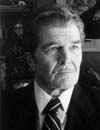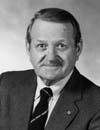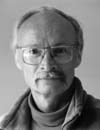
| ||
 | ||
Arts, Social Work, Management, Music, and Religious Studies

Michael Mann |
Manchester-born Michael Mann is considered by some to be the most significant sociologist since the classical theorists a century ago, someone with the status of Max Weber and a passionate commitment to social democracy to boot. His masterpiece, The Sources of Social Power, the first volume of which appeared in 1986, the second in 1993, is an exercise in social theory aimed at giving the reader the most complete set of analytical tools that the historical record will allow. The first two volumes of this book are an account of the development of and relationships between military, economic, ideological and political sources of power from the beginning of time until 1914. He is currently working on the third volume. Mann is also at work on a monograph on the fascist movements of twentieth century Europe, an earlier version of which was delivered as a lecture at McGill where he is a friend and frequent visitor. From the beginning of his studies, Mann's interest has been in labour markets and the nature of power. His Oxford-earned doctorate was published in 1973 as Workers on the Move: The Sociology of Relocation. After working at Cambridge University and the London School of Economics, Mann crossed the Atlantic in 1987 to begin working at the University of California (Los Angeles), where he remains. |

Amartya Sen |
Harvard economist Amartya Sen is perhaps best known for his research on hunger and famines. It was through his examination of the Bengal famine of 1943 (three million lives lost), published in 1981 as Poverty and Famines, that Sen's concept of famines as "entitlement failures" (as opposed to shortages of food) was established. Sen further elaborated the concept in the 1989 publication of Hunger and Public Action, a comparison of hunger and famine in Asia, Africa and Latin America which he co-authored with Jean Drize of the Delhi School of Economics. After earning his doctorate in 1959 at Cambridge University, Sen worked at the Delhi School of Economics, the London School of Economics and Oxford University. Still a citizen of India, Sen has turned his attention in recent years to the problems of his country. Indian Economic Development and Social Opportunity and Indian Development: Selected Regional Perspectives are his most recent books published (co-authored with Drize). He maintains that the debate between the proponents of free markets and those of state economic management overlooks the fundamental problems of hunger, poverty, disease, illiteracy, inequality, etc. Neither one nor the other ideology will solve these problems, he maintains, without public debate, action and institution-building by an educated, informed citizenry. |

Noam Chomsky |
Noam Chomsky says that his formative education came not from the "elite" high school he attended but from the intense philosophical discussions among the Jewish working-class intellectuals that gathered around his uncle's news stand in New York. Nevertheless, the world-renowned scholar of linguistics, political analyst and activist continued with his formal education, finishing in 1955 with a PhD in linguistics from the University of Pennsylvania. His early work on "generative grammar" gained him recognition in the '50s, while in the '60s, his "transformational grammar" won him acclaim. The '60s also saw Chomsky active on the campus of the Massachusetts Institute of Technology, protesting U.S. involvement in Vietnam and other countries. His concern regarding American imperialist policy led to the writing of numerous popular books on American foreign policy and propaganda, such as Towards a New Cold War and Manufacturing Consent. The latter was also the title of a highly popular Montreal-made feature film on Chomsky. Titles of his linguistics books include The Sound Pattern of English, Cartesian Linguistics and Language and Mind. The recipient of numerous honorary degrees, Chomsky has also been invited to give the John Locke Lectures at Oxford University (1969), the Bertrand Russell Memorial Lecture at Cambridge University (1970) and the Nehru Memorial Lecture in New Delhi (1972). Still at MIT, where he has taught since 1955, Chomsky is now using his rationalist conception of mind and human nature to point to links between his formal linguistics and his political views. |

Marin Puhvel |
Martin Puhvel has been associated with the Department of English for almost 50 years. Beginning at the University as an undergraduate in 1949, his only break from studying or teaching at McGill was the four years, from 1954 to 1958, that he spent doing his doctorate at Harvard University. For most of his career, this specialist in Anglo-Saxon, Middle English and early Renaissance literature has worked to preserve the field of folklore studies at McGill, a field that draws on a knowledge of philology, poetics and literary history. His work on Beowulf and Irish Battle Rage tradition continues to be cited in scholarly literature. Puhvel is the last of that distinguished generation of McGill scholars which includes Louis Dudek and Joyce Hemlow. His skill at story-telling, coloured by his Estonian accent, is legendary among former students. |

Marc Adélard Tremblay |
Marc-Adélard Tremblay is one of Canada's most distinguished teachers and researchers in the social sciences. Born in Les Éboulements, Quebec, in 1922, Tremblay studied at the collèges classiques Saint-Ignace and Sainte-Marie before enrolling at the Institut agricole d'Oka. Bitten by rural sociology, he did his master's degree at Laval University, then went to Cornell University for his doctorate. Acadian and Navaho communities were his subjects while at Cornell and it was there where the foundation of his concern regarding the impact of rapid social and economic change on people was born. Returning to Quebec in 1956, he taught at Laval University where he founded the department of anthropology in 1970 and continued to study Acadian communities in Nova Scotia and the francophone communities of Quebec's Lower North Shore. Tremblay's concern for the treatment of rural communities also extended to Canadian native people. Between 1964 and 1968, he was associate director of a federal survey of Canadian Indians. Most of the recommendations in the Hawthorn-Tremblay Report regarding the paternalism of the federal government were ignored but they served to ignite public debate. An officer of the Order of Canada, Tremblay's scholarly work has been recognized numerous times with prizes and positions, most recently by the Society for Applied Anthropology in Canada which established in 1992 the Weaver-Tremblay Prize, named after Marc-Adélard Tremblay and a deceased colleague from Ontario. |

William C. Wees |
William Wees played a formative role in the establishment of film studies at McGill, was a founding member of the graduate program in communications and a director of the cultural studies program. He came to McGill in 1969, after completing his graduate studies in English at Northwestern University. By 1972, with the publication of his first book, Vorticism and the English Avant-Garde, Wees had established himself as an authority in the field of British modernism. His subsequent research on avant-gardism led to avant-garde cinema. The author of more than 30 articles on contemporary cinema, Wees has also curated several major international exhibits on the art of cinema. The publication in 1992 of Light Moving in Time, a study of avant-garde film, was followed by Wees's promotion to full professor in 1994. Wees is not only a film theoretician and curator. He has also made six short films and has served as president of the Film Studies Association of Canada and on the executive committee of the Canadian Film Institute. Since his retirement in 1996, Wees has continued to be a leader in cinema studies, as evidenced by his appointment to the senior editorship of the Canadian Journal of Film Studies. |

Charles Taylor |
Charles Taylor is Canada's foremost and best-known philosopher and a long-time associate of McGill University. After finishing his doctorate at Oxford University, the Rhodes Scholar returned in 1961 to Montreal to teach at McGill, first in the political science department, later in philosophy. During the '60s and early '70s, the half-francophone, half-anglophone Taylor was also associated with the Université de Montréal in the field of philosophy. Taylor also spent five years, from 1976 to 1981, as the Chichele Professor of Social and Political Theory at Oxford University. His connection to Europe was forged while he was a student in the '50s, when Taylor helped receive and care for refugees fleeing Hungary. The world-renowned political philosopher has been counsel to the Czech Republic's Vaclav Havel, Mikhail Gorbachev and, over the years, he has served as spiritual missionary and communication link between the Pope and the Dalai Lama. Politics in practice has also lured Taylor for periods of time. From 1963 to 1971 he was national vice-president of the NDP and ran, unsuccessfully, three times for federal office during the 1960s. His books, on the other hand, have been successful among scholars and lay readers alike. Sources of the Self and The Malaise of Modernity have been popular in Canada in both official languages. In 1996, Taylor was made a companion of the Order of Canada and in 1992 he received the Prix du Québec Léon Gérin. |
|
| |||||